Writing and Inquiry: Analysis of Food Insecurity in New Zealand
VerifiedAdded on 2022/09/22
|8
|1807
|24
Report
AI Summary
This report analyzes the issue of food insecurity in New Zealand, focusing on the perspectives presented in the article "Nutritionism and the construction of 'poor choices' in families experiencing food insecurity" from the Journal of Health Psychology. The report examines the impact of food insecurity on families, the role of nutritionism, and the influence of socioeconomic status. It discusses the challenges faced by low-income families in accessing healthy foods and the limitations of current approaches that emphasize nutritionally balanced diets without addressing the underlying causes of food poverty. The report also explores the experiences of individuals relying on charitable meals and highlights the need for policy changes to tackle the problem of food insecurity, including addressing housing costs. The analysis emphasizes the importance of understanding the contextual origins of food insecurity and calls for a shift in how nutrition experts approach this issue.
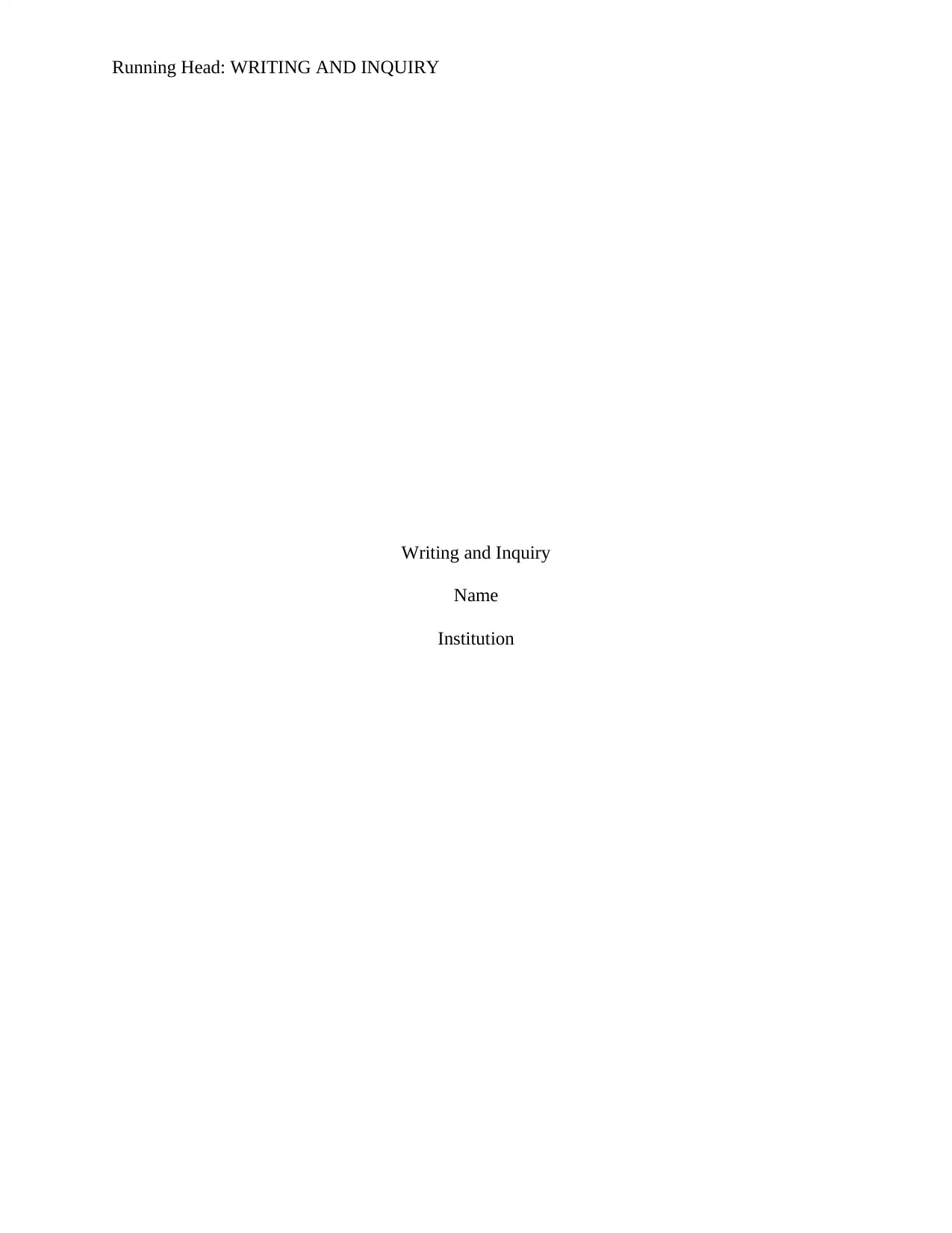
Running Head: WRITING AND INQUIRY
Writing and Inquiry
Name
Institution
Writing and Inquiry
Name
Institution
Paraphrase This Document
Need a fresh take? Get an instant paraphrase of this document with our AI Paraphraser
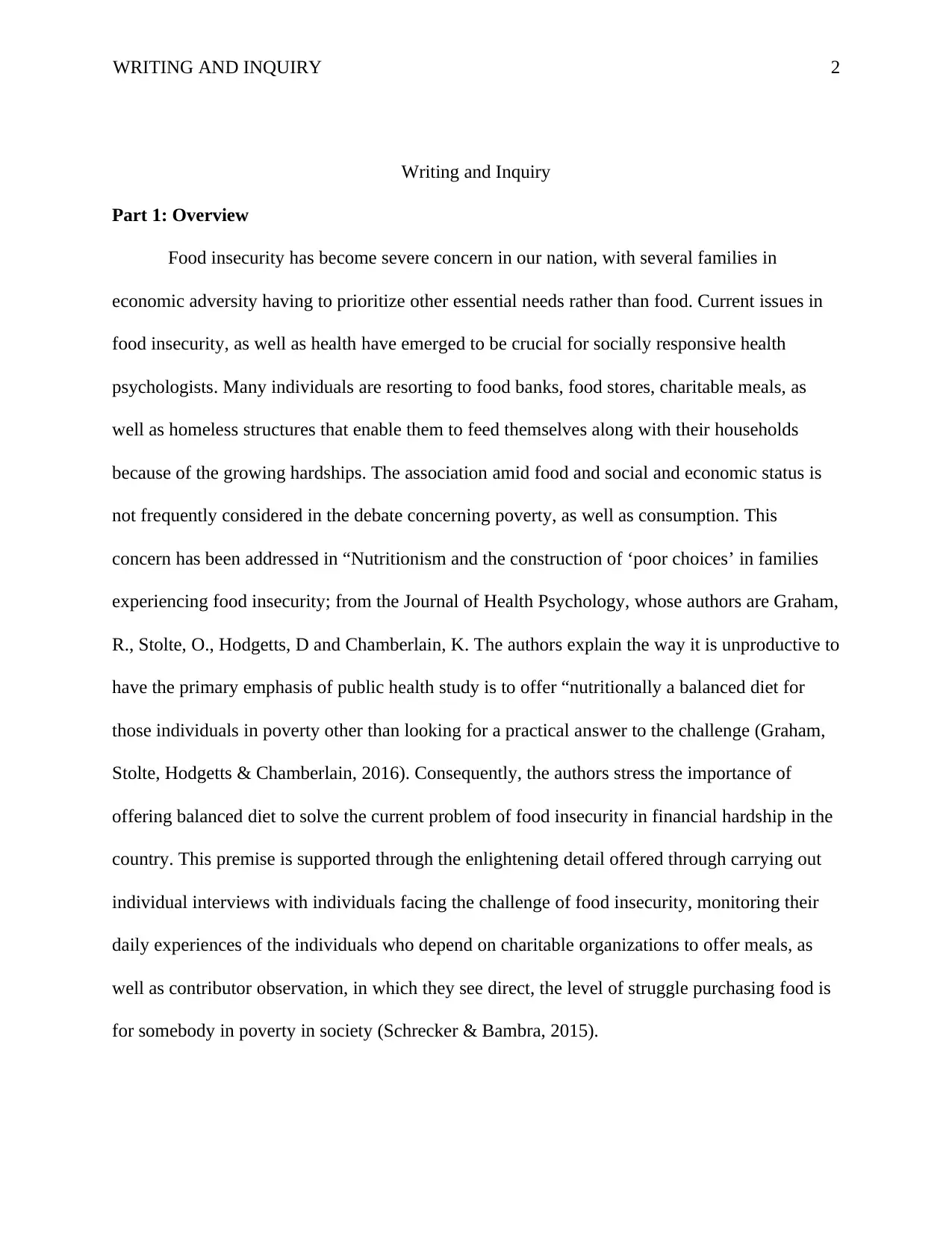
WRITING AND INQUIRY 2
Writing and Inquiry
Part 1: Overview
Food insecurity has become severe concern in our nation, with several families in
economic adversity having to prioritize other essential needs rather than food. Current issues in
food insecurity, as well as health have emerged to be crucial for socially responsive health
psychologists. Many individuals are resorting to food banks, food stores, charitable meals, as
well as homeless structures that enable them to feed themselves along with their households
because of the growing hardships. The association amid food and social and economic status is
not frequently considered in the debate concerning poverty, as well as consumption. This
concern has been addressed in “Nutritionism and the construction of ‘poor choices’ in families
experiencing food insecurity; from the Journal of Health Psychology, whose authors are Graham,
R., Stolte, O., Hodgetts, D and Chamberlain, K. The authors explain the way it is unproductive to
have the primary emphasis of public health study is to offer “nutritionally a balanced diet for
those individuals in poverty other than looking for a practical answer to the challenge (Graham,
Stolte, Hodgetts & Chamberlain, 2016). Consequently, the authors stress the importance of
offering balanced diet to solve the current problem of food insecurity in financial hardship in the
country. This premise is supported through the enlightening detail offered through carrying out
individual interviews with individuals facing the challenge of food insecurity, monitoring their
daily experiences of the individuals who depend on charitable organizations to offer meals, as
well as contributor observation, in which they see direct, the level of struggle purchasing food is
for somebody in poverty in society (Schrecker & Bambra, 2015).
Writing and Inquiry
Part 1: Overview
Food insecurity has become severe concern in our nation, with several families in
economic adversity having to prioritize other essential needs rather than food. Current issues in
food insecurity, as well as health have emerged to be crucial for socially responsive health
psychologists. Many individuals are resorting to food banks, food stores, charitable meals, as
well as homeless structures that enable them to feed themselves along with their households
because of the growing hardships. The association amid food and social and economic status is
not frequently considered in the debate concerning poverty, as well as consumption. This
concern has been addressed in “Nutritionism and the construction of ‘poor choices’ in families
experiencing food insecurity; from the Journal of Health Psychology, whose authors are Graham,
R., Stolte, O., Hodgetts, D and Chamberlain, K. The authors explain the way it is unproductive to
have the primary emphasis of public health study is to offer “nutritionally a balanced diet for
those individuals in poverty other than looking for a practical answer to the challenge (Graham,
Stolte, Hodgetts & Chamberlain, 2016). Consequently, the authors stress the importance of
offering balanced diet to solve the current problem of food insecurity in financial hardship in the
country. This premise is supported through the enlightening detail offered through carrying out
individual interviews with individuals facing the challenge of food insecurity, monitoring their
daily experiences of the individuals who depend on charitable organizations to offer meals, as
well as contributor observation, in which they see direct, the level of struggle purchasing food is
for somebody in poverty in society (Schrecker & Bambra, 2015).
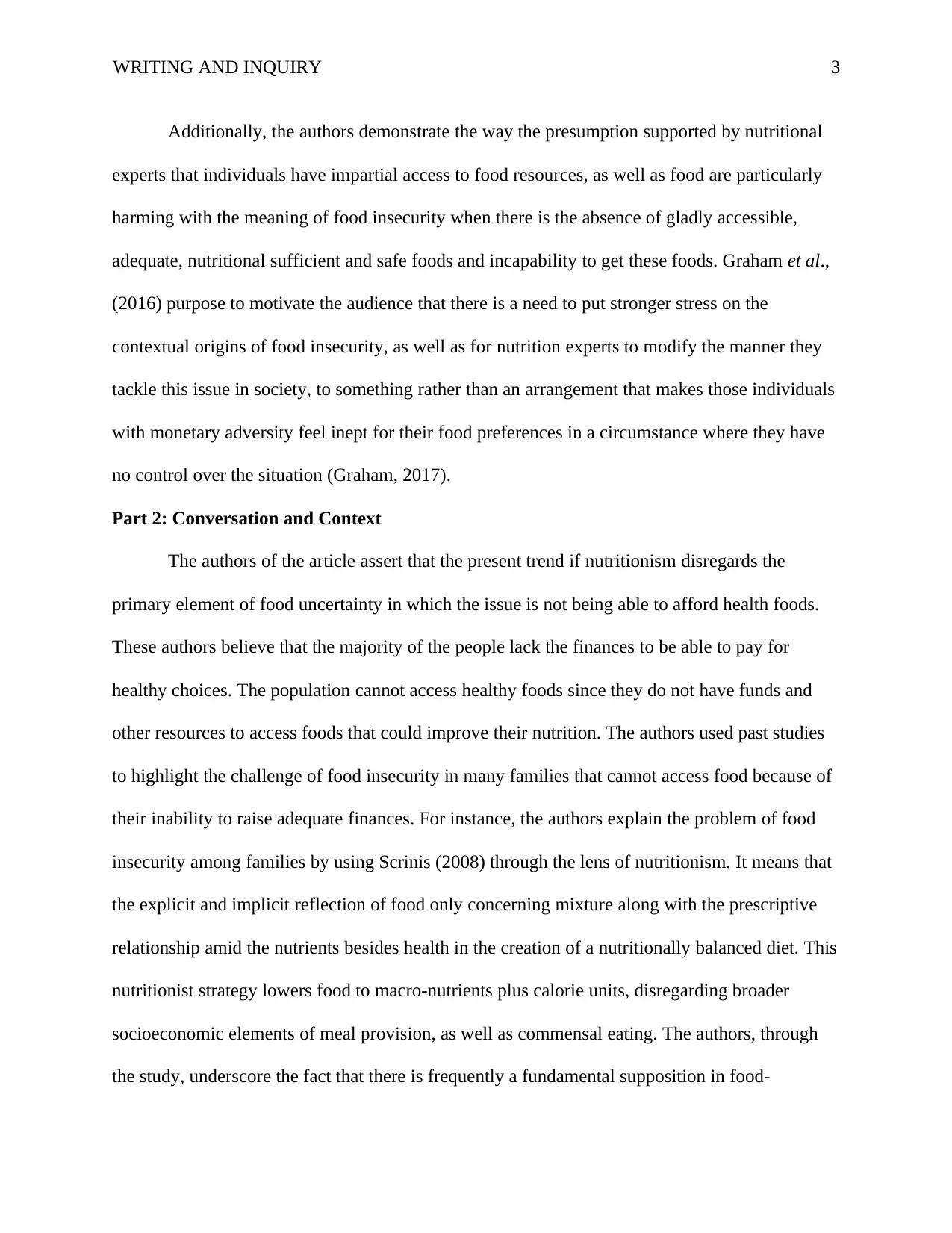
WRITING AND INQUIRY 3
Additionally, the authors demonstrate the way the presumption supported by nutritional
experts that individuals have impartial access to food resources, as well as food are particularly
harming with the meaning of food insecurity when there is the absence of gladly accessible,
adequate, nutritional sufficient and safe foods and incapability to get these foods. Graham et al.,
(2016) purpose to motivate the audience that there is a need to put stronger stress on the
contextual origins of food insecurity, as well as for nutrition experts to modify the manner they
tackle this issue in society, to something rather than an arrangement that makes those individuals
with monetary adversity feel inept for their food preferences in a circumstance where they have
no control over the situation (Graham, 2017).
Part 2: Conversation and Context
The authors of the article assert that the present trend if nutritionism disregards the
primary element of food uncertainty in which the issue is not being able to afford health foods.
These authors believe that the majority of the people lack the finances to be able to pay for
healthy choices. The population cannot access healthy foods since they do not have funds and
other resources to access foods that could improve their nutrition. The authors used past studies
to highlight the challenge of food insecurity in many families that cannot access food because of
their inability to raise adequate finances. For instance, the authors explain the problem of food
insecurity among families by using Scrinis (2008) through the lens of nutritionism. It means that
the explicit and implicit reflection of food only concerning mixture along with the prescriptive
relationship amid the nutrients besides health in the creation of a nutritionally balanced diet. This
nutritionist strategy lowers food to macro-nutrients plus calorie units, disregarding broader
socioeconomic elements of meal provision, as well as commensal eating. The authors, through
the study, underscore the fact that there is frequently a fundamental supposition in food-
Additionally, the authors demonstrate the way the presumption supported by nutritional
experts that individuals have impartial access to food resources, as well as food are particularly
harming with the meaning of food insecurity when there is the absence of gladly accessible,
adequate, nutritional sufficient and safe foods and incapability to get these foods. Graham et al.,
(2016) purpose to motivate the audience that there is a need to put stronger stress on the
contextual origins of food insecurity, as well as for nutrition experts to modify the manner they
tackle this issue in society, to something rather than an arrangement that makes those individuals
with monetary adversity feel inept for their food preferences in a circumstance where they have
no control over the situation (Graham, 2017).
Part 2: Conversation and Context
The authors of the article assert that the present trend if nutritionism disregards the
primary element of food uncertainty in which the issue is not being able to afford health foods.
These authors believe that the majority of the people lack the finances to be able to pay for
healthy choices. The population cannot access healthy foods since they do not have funds and
other resources to access foods that could improve their nutrition. The authors used past studies
to highlight the challenge of food insecurity in many families that cannot access food because of
their inability to raise adequate finances. For instance, the authors explain the problem of food
insecurity among families by using Scrinis (2008) through the lens of nutritionism. It means that
the explicit and implicit reflection of food only concerning mixture along with the prescriptive
relationship amid the nutrients besides health in the creation of a nutritionally balanced diet. This
nutritionist strategy lowers food to macro-nutrients plus calorie units, disregarding broader
socioeconomic elements of meal provision, as well as commensal eating. The authors, through
the study, underscore the fact that there is frequently a fundamental supposition in food-
⊘ This is a preview!⊘
Do you want full access?
Subscribe today to unlock all pages.

Trusted by 1+ million students worldwide
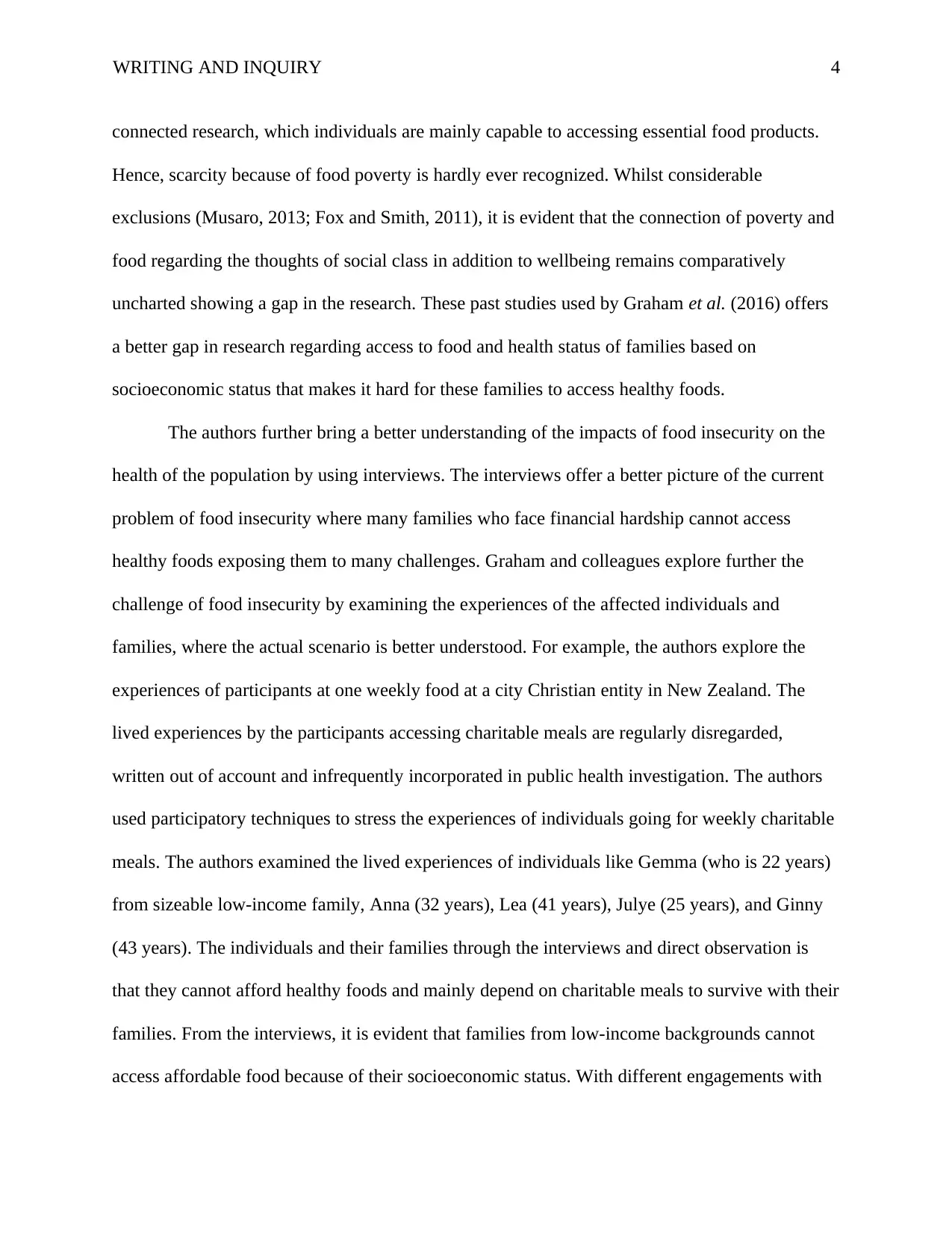
WRITING AND INQUIRY 4
connected research, which individuals are mainly capable to accessing essential food products.
Hence, scarcity because of food poverty is hardly ever recognized. Whilst considerable
exclusions (Musaro, 2013; Fox and Smith, 2011), it is evident that the connection of poverty and
food regarding the thoughts of social class in addition to wellbeing remains comparatively
uncharted showing a gap in the research. These past studies used by Graham et al. (2016) offers
a better gap in research regarding access to food and health status of families based on
socioeconomic status that makes it hard for these families to access healthy foods.
The authors further bring a better understanding of the impacts of food insecurity on the
health of the population by using interviews. The interviews offer a better picture of the current
problem of food insecurity where many families who face financial hardship cannot access
healthy foods exposing them to many challenges. Graham and colleagues explore further the
challenge of food insecurity by examining the experiences of the affected individuals and
families, where the actual scenario is better understood. For example, the authors explore the
experiences of participants at one weekly food at a city Christian entity in New Zealand. The
lived experiences by the participants accessing charitable meals are regularly disregarded,
written out of account and infrequently incorporated in public health investigation. The authors
used participatory techniques to stress the experiences of individuals going for weekly charitable
meals. The authors examined the lived experiences of individuals like Gemma (who is 22 years)
from sizeable low-income family, Anna (32 years), Lea (41 years), Julye (25 years), and Ginny
(43 years). The individuals and their families through the interviews and direct observation is
that they cannot afford healthy foods and mainly depend on charitable meals to survive with their
families. From the interviews, it is evident that families from low-income backgrounds cannot
access affordable food because of their socioeconomic status. With different engagements with
connected research, which individuals are mainly capable to accessing essential food products.
Hence, scarcity because of food poverty is hardly ever recognized. Whilst considerable
exclusions (Musaro, 2013; Fox and Smith, 2011), it is evident that the connection of poverty and
food regarding the thoughts of social class in addition to wellbeing remains comparatively
uncharted showing a gap in the research. These past studies used by Graham et al. (2016) offers
a better gap in research regarding access to food and health status of families based on
socioeconomic status that makes it hard for these families to access healthy foods.
The authors further bring a better understanding of the impacts of food insecurity on the
health of the population by using interviews. The interviews offer a better picture of the current
problem of food insecurity where many families who face financial hardship cannot access
healthy foods exposing them to many challenges. Graham and colleagues explore further the
challenge of food insecurity by examining the experiences of the affected individuals and
families, where the actual scenario is better understood. For example, the authors explore the
experiences of participants at one weekly food at a city Christian entity in New Zealand. The
lived experiences by the participants accessing charitable meals are regularly disregarded,
written out of account and infrequently incorporated in public health investigation. The authors
used participatory techniques to stress the experiences of individuals going for weekly charitable
meals. The authors examined the lived experiences of individuals like Gemma (who is 22 years)
from sizeable low-income family, Anna (32 years), Lea (41 years), Julye (25 years), and Ginny
(43 years). The individuals and their families through the interviews and direct observation is
that they cannot afford healthy foods and mainly depend on charitable meals to survive with their
families. From the interviews, it is evident that families from low-income backgrounds cannot
access affordable food because of their socioeconomic status. With different engagements with
Paraphrase This Document
Need a fresh take? Get an instant paraphrase of this document with our AI Paraphraser
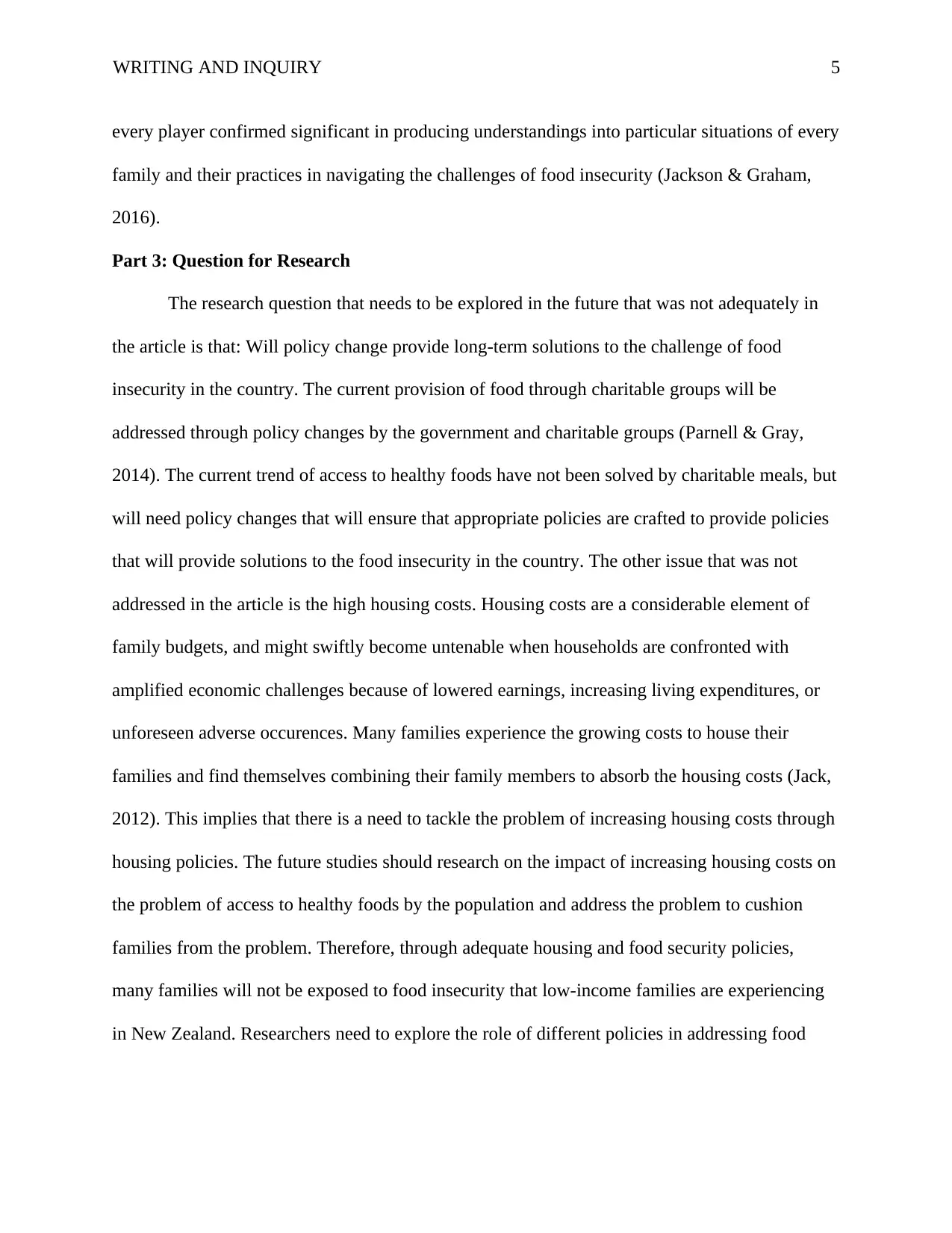
WRITING AND INQUIRY 5
every player confirmed significant in producing understandings into particular situations of every
family and their practices in navigating the challenges of food insecurity (Jackson & Graham,
2016).
Part 3: Question for Research
The research question that needs to be explored in the future that was not adequately in
the article is that: Will policy change provide long-term solutions to the challenge of food
insecurity in the country. The current provision of food through charitable groups will be
addressed through policy changes by the government and charitable groups (Parnell & Gray,
2014). The current trend of access to healthy foods have not been solved by charitable meals, but
will need policy changes that will ensure that appropriate policies are crafted to provide policies
that will provide solutions to the food insecurity in the country. The other issue that was not
addressed in the article is the high housing costs. Housing costs are a considerable element of
family budgets, and might swiftly become untenable when households are confronted with
amplified economic challenges because of lowered earnings, increasing living expenditures, or
unforeseen adverse occurences. Many families experience the growing costs to house their
families and find themselves combining their family members to absorb the housing costs (Jack,
2012). This implies that there is a need to tackle the problem of increasing housing costs through
housing policies. The future studies should research on the impact of increasing housing costs on
the problem of access to healthy foods by the population and address the problem to cushion
families from the problem. Therefore, through adequate housing and food security policies,
many families will not be exposed to food insecurity that low-income families are experiencing
in New Zealand. Researchers need to explore the role of different policies in addressing food
every player confirmed significant in producing understandings into particular situations of every
family and their practices in navigating the challenges of food insecurity (Jackson & Graham,
2016).
Part 3: Question for Research
The research question that needs to be explored in the future that was not adequately in
the article is that: Will policy change provide long-term solutions to the challenge of food
insecurity in the country. The current provision of food through charitable groups will be
addressed through policy changes by the government and charitable groups (Parnell & Gray,
2014). The current trend of access to healthy foods have not been solved by charitable meals, but
will need policy changes that will ensure that appropriate policies are crafted to provide policies
that will provide solutions to the food insecurity in the country. The other issue that was not
addressed in the article is the high housing costs. Housing costs are a considerable element of
family budgets, and might swiftly become untenable when households are confronted with
amplified economic challenges because of lowered earnings, increasing living expenditures, or
unforeseen adverse occurences. Many families experience the growing costs to house their
families and find themselves combining their family members to absorb the housing costs (Jack,
2012). This implies that there is a need to tackle the problem of increasing housing costs through
housing policies. The future studies should research on the impact of increasing housing costs on
the problem of access to healthy foods by the population and address the problem to cushion
families from the problem. Therefore, through adequate housing and food security policies,
many families will not be exposed to food insecurity that low-income families are experiencing
in New Zealand. Researchers need to explore the role of different policies in addressing food
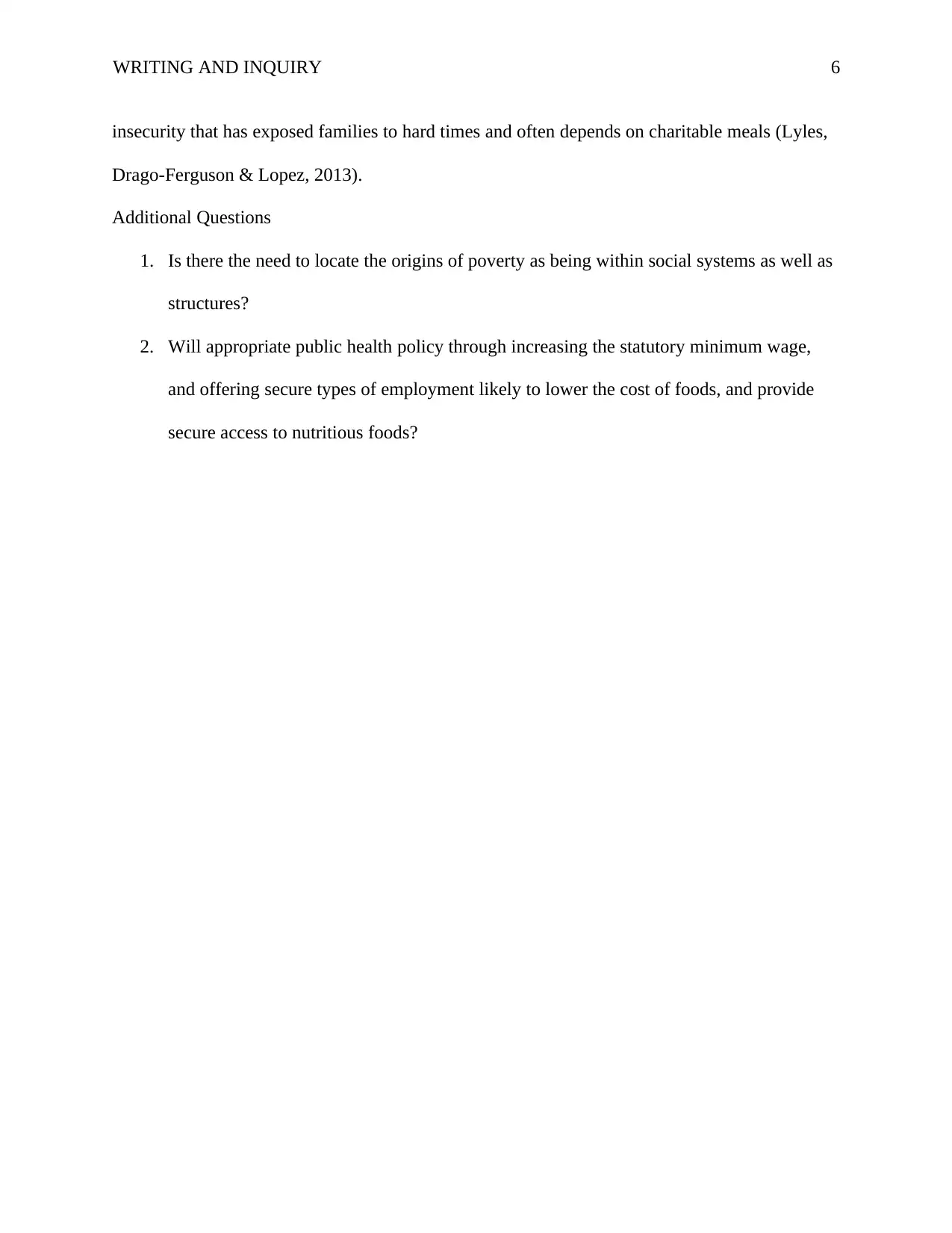
WRITING AND INQUIRY 6
insecurity that has exposed families to hard times and often depends on charitable meals (Lyles,
Drago-Ferguson & Lopez, 2013).
Additional Questions
1. Is there the need to locate the origins of poverty as being within social systems as well as
structures?
2. Will appropriate public health policy through increasing the statutory minimum wage,
and offering secure types of employment likely to lower the cost of foods, and provide
secure access to nutritious foods?
insecurity that has exposed families to hard times and often depends on charitable meals (Lyles,
Drago-Ferguson & Lopez, 2013).
Additional Questions
1. Is there the need to locate the origins of poverty as being within social systems as well as
structures?
2. Will appropriate public health policy through increasing the statutory minimum wage,
and offering secure types of employment likely to lower the cost of foods, and provide
secure access to nutritious foods?
⊘ This is a preview!⊘
Do you want full access?
Subscribe today to unlock all pages.

Trusted by 1+ million students worldwide
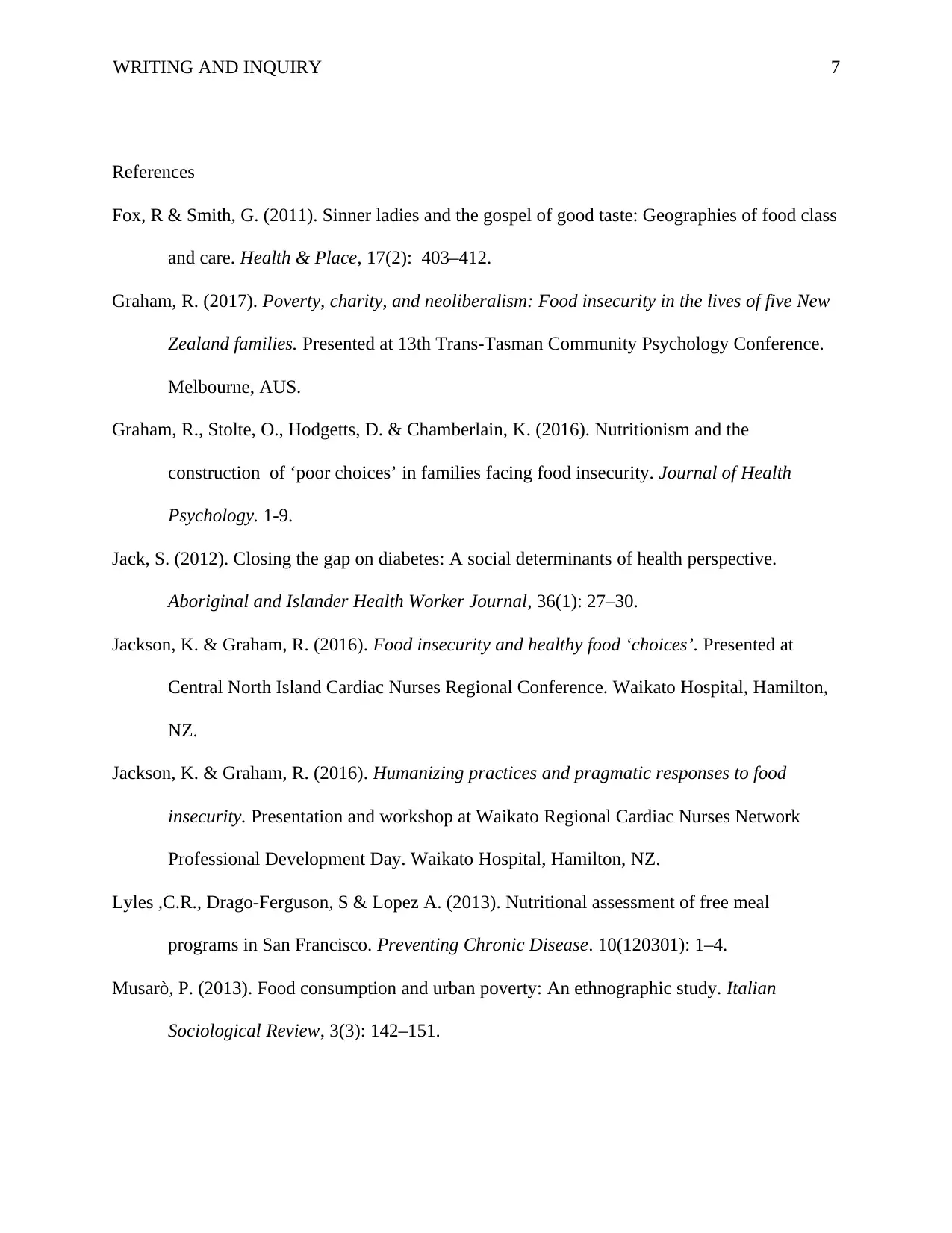
WRITING AND INQUIRY 7
References
Fox, R & Smith, G. (2011). Sinner ladies and the gospel of good taste: Geographies of food class
and care. Health & Place, 17(2): 403–412.
Graham, R. (2017). Poverty, charity, and neoliberalism: Food insecurity in the lives of five New
Zealand families. Presented at 13th Trans-Tasman Community Psychology Conference.
Melbourne, AUS.
Graham, R., Stolte, O., Hodgetts, D. & Chamberlain, K. (2016). Nutritionism and the
construction of ‘poor choices’ in families facing food insecurity. Journal of Health
Psychology. 1-9.
Jack, S. (2012). Closing the gap on diabetes: A social determinants of health perspective.
Aboriginal and Islander Health Worker Journal, 36(1): 27–30.
Jackson, K. & Graham, R. (2016). Food insecurity and healthy food ‘choices’. Presented at
Central North Island Cardiac Nurses Regional Conference. Waikato Hospital, Hamilton,
NZ.
Jackson, K. & Graham, R. (2016). Humanizing practices and pragmatic responses to food
insecurity. Presentation and workshop at Waikato Regional Cardiac Nurses Network
Professional Development Day. Waikato Hospital, Hamilton, NZ.
Lyles ,C.R., Drago-Ferguson, S & Lopez A. (2013). Nutritional assessment of free meal
programs in San Francisco. Preventing Chronic Disease. 10(120301): 1–4.
Musarò, P. (2013). Food consumption and urban poverty: An ethnographic study. Italian
Sociological Review, 3(3): 142–151.
References
Fox, R & Smith, G. (2011). Sinner ladies and the gospel of good taste: Geographies of food class
and care. Health & Place, 17(2): 403–412.
Graham, R. (2017). Poverty, charity, and neoliberalism: Food insecurity in the lives of five New
Zealand families. Presented at 13th Trans-Tasman Community Psychology Conference.
Melbourne, AUS.
Graham, R., Stolte, O., Hodgetts, D. & Chamberlain, K. (2016). Nutritionism and the
construction of ‘poor choices’ in families facing food insecurity. Journal of Health
Psychology. 1-9.
Jack, S. (2012). Closing the gap on diabetes: A social determinants of health perspective.
Aboriginal and Islander Health Worker Journal, 36(1): 27–30.
Jackson, K. & Graham, R. (2016). Food insecurity and healthy food ‘choices’. Presented at
Central North Island Cardiac Nurses Regional Conference. Waikato Hospital, Hamilton,
NZ.
Jackson, K. & Graham, R. (2016). Humanizing practices and pragmatic responses to food
insecurity. Presentation and workshop at Waikato Regional Cardiac Nurses Network
Professional Development Day. Waikato Hospital, Hamilton, NZ.
Lyles ,C.R., Drago-Ferguson, S & Lopez A. (2013). Nutritional assessment of free meal
programs in San Francisco. Preventing Chronic Disease. 10(120301): 1–4.
Musarò, P. (2013). Food consumption and urban poverty: An ethnographic study. Italian
Sociological Review, 3(3): 142–151.
Paraphrase This Document
Need a fresh take? Get an instant paraphrase of this document with our AI Paraphraser
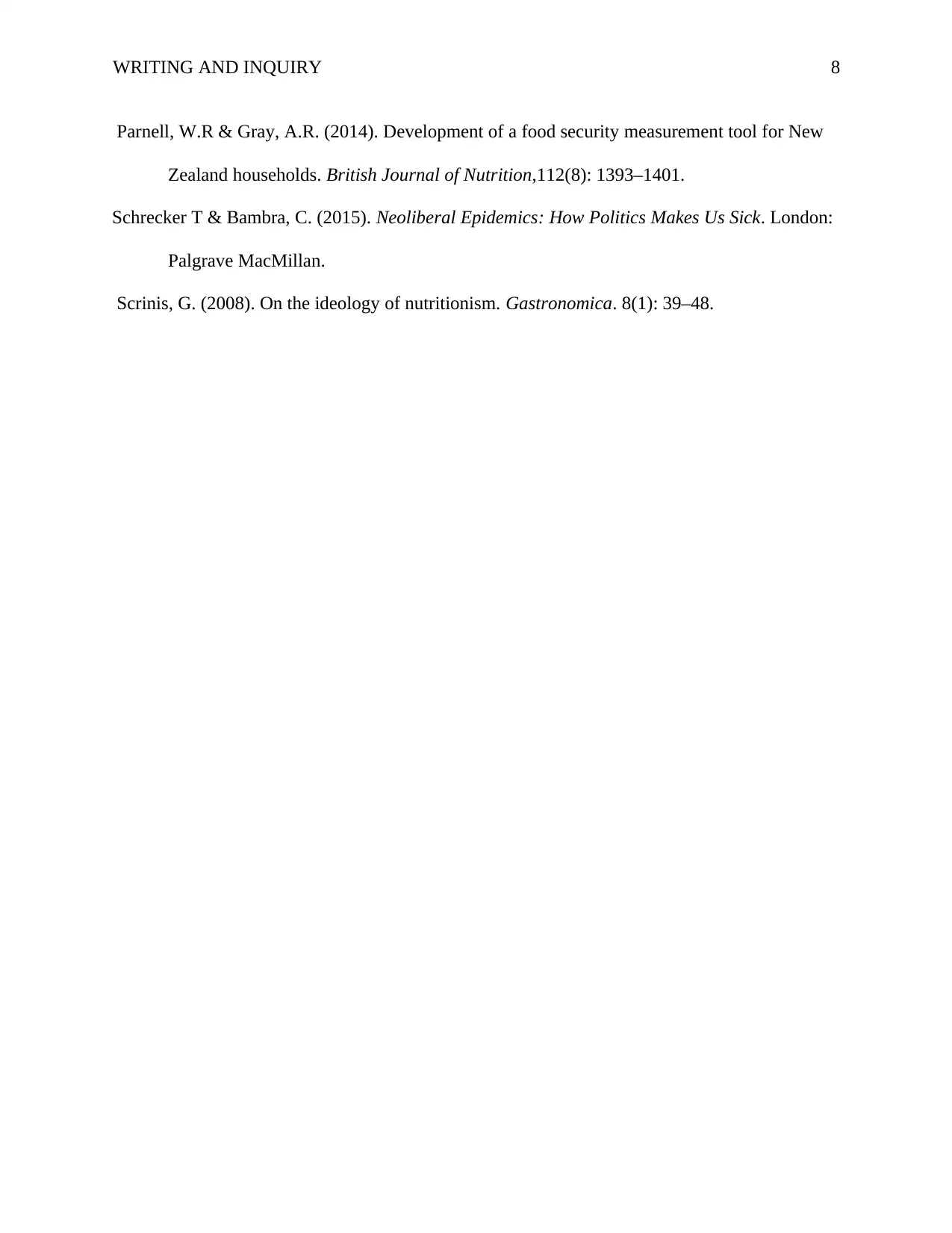
WRITING AND INQUIRY 8
Parnell, W.R & Gray, A.R. (2014). Development of a food security measurement tool for New
Zealand households. British Journal of Nutrition,112(8): 1393–1401.
Schrecker T & Bambra, C. (2015). Neoliberal Epidemics: How Politics Makes Us Sick. London:
Palgrave MacMillan.
Scrinis, G. (2008). On the ideology of nutritionism. Gastronomica. 8(1): 39–48.
Parnell, W.R & Gray, A.R. (2014). Development of a food security measurement tool for New
Zealand households. British Journal of Nutrition,112(8): 1393–1401.
Schrecker T & Bambra, C. (2015). Neoliberal Epidemics: How Politics Makes Us Sick. London:
Palgrave MacMillan.
Scrinis, G. (2008). On the ideology of nutritionism. Gastronomica. 8(1): 39–48.
1 out of 8
Your All-in-One AI-Powered Toolkit for Academic Success.
+13062052269
info@desklib.com
Available 24*7 on WhatsApp / Email
![[object Object]](/_next/static/media/star-bottom.7253800d.svg)
Unlock your academic potential
Copyright © 2020–2026 A2Z Services. All Rights Reserved. Developed and managed by ZUCOL.